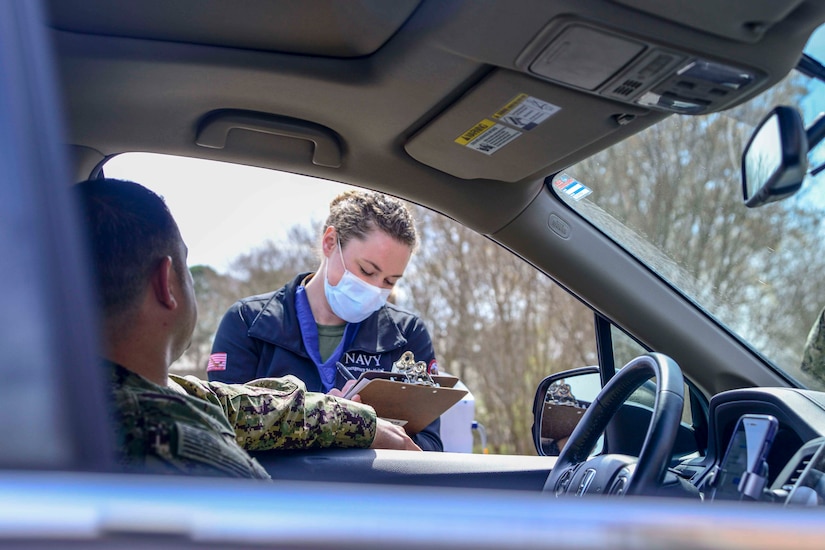April 15, 2020 | BY Navy Seaman Ariana Torman , DOD News
A "car triage" screening process in place at Naval
Medical Center Portsmouth in Virginia is designed to triage, test and treat
low-acuity patients suspected to have COVID-19 and to protect medical staff by
doing so in an open-air environment.
"This is all designed to keep patients in their
vehicle, preventing spread of potential infections in waiting rooms and
treatment areas of the hospital," Navy Cmdr. (Dr.) Peter Cole, the
emergency medicine department chair, said. "Most patients are in and out
in less than 45 minutes."
Vehicles that pull up to the main gate are directed to the
right lane if they intend to go to the emergency department or if they have
potential COVID-19 concerns. The vehicles then head to a parking lot where tents are set up. An initial
screener asks a few simple questions while the patients remain in their
vehicles, and the patients are directed either to the ED or to the car triage
station, as appropriate.
"Nurses, dentists and corps staff have a list of
criteria by which a patient is deemed safe for evaluation in their
vehicle," Cole said. "If need be, they may be directed either to the
ED for further care or to the second tent, where they will remain in their
vehicle and get evaluated by a licensed provider. There are evaluation areas
available if the provider needs to have the patient get out of the car, but
this usually is not necessary."
A portable X-ray capability is available in case a chest
X-ray is required. After the evaluation, the provider may prescribe medicines —
these are all on-hand, eliminating the need for patients to wait in the
pharmacy, Cole said.
The success of the car triage process has been due to the
efforts of the entire command, Cole said, including medical center leadership,
the emergency management and all the personnel who have been sent from other
areas of the medical center to assist.
The car triage process has had a great impact on the
emergency department and the medical center as a whole, Cole said.
"One of the greatest concerns in a global pandemic is
the overwhelming of hospital resources due to the sheer volume of patients who
are seeking care," he said. "It has been a tremendous help to keep
the ED flowing smoothly. Since it started, the average length of stay in the ED
dropped almost 30 minutes per patient. This may not seem like a lot, but when
you realize we see almost 6,000 patients a month, it certainly adds up."
The percentage of patients who left without being seen by a
provider has dropped to zero in the last two weeks, the doctor noted.
Cole said the medical center's admission rate rose 170
percent, showing that the patients who make it to the ED are the ones who truly
need to be there.
Along with car triage, the medical center's COVID-19 call
center and screening advice line have helped to reduce the amount of foot
traffic through the emergency department.
"Patients can call in and get better directions on what
they should do if they believe they have symptoms," said Navy Petty
Officer 2nd Class Michael Doxtator, a hospital corpsman and the car triage team
lead. "Between the call center and the triage, we are really helping make
a difference during this situation."
Since it began, the car triage team has refined the process
as more information became available.
"This has been a group effort from the start, requiring
heavy lifting from almost every directorate and a number of departments,"
Cole said. "This would not be possible without the assistance of dozens of
people from all over contributing to the effort. Everyone can be very proud of
this. It is something about which the entire command can hold their head
high."
(Navy Seaman Ariana Torman is assigned to Naval Medical Center
Portsmouth.)

No comments:
Post a Comment